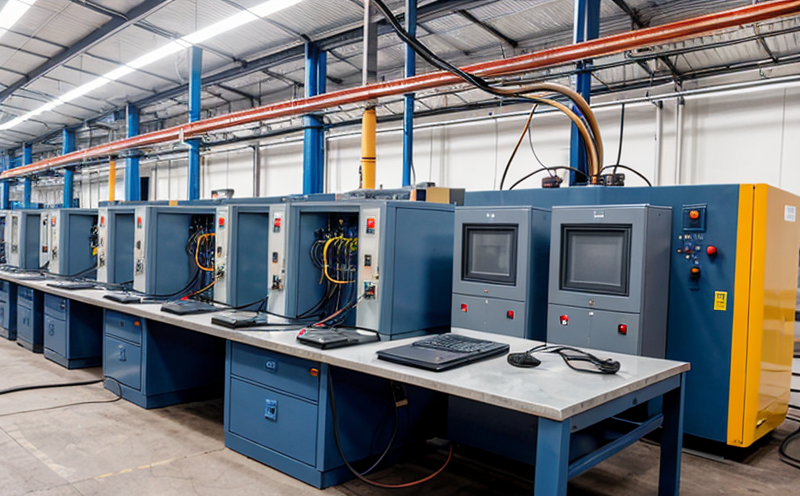Industrial Electrical & Control Systems Testing
The testing of industrial electrical and control systems is a critical component in ensuring the reliability, safety, and performance of complex machinery and processes across various sectors. From automotive manufacturing to chemical processing, these systems are integral to efficient operations. This service encompasses a wide array of tests designed to evaluate the integrity, functionality, and compliance of electrical components and control systems.
At its core, this testing ensures that every system operates as intended under all conditions, from initial design through to long-term use. Compliance with international standards such as ISO 13406 for medical devices or IEC 62067 for intelligent electronic devices is paramount in ensuring the safety and reliability of these systems.
The process begins with a thorough inspection of the system's architecture, including circuit diagrams, schematics, and control logic. This step ensures that all components are correctly specified and installed according to best practices. Subsequent stages involve rigorous testing procedures aimed at identifying any potential weaknesses or non-compliance issues early in the lifecycle.
One key aspect of this service is the use of advanced test equipment capable of simulating real-world operating conditions, such as temperature fluctuations, voltage surges, and mechanical stresses. This allows engineers to assess how well each system performs under challenging scenarios without risking damage or downtime during production runs.
The testing also covers functional checks that verify the accuracy of control algorithms and signal processing capabilities. These tests are crucial for ensuring consistent performance across different parts of a manufacturing line or process flow. Additionally, electromagnetic compatibility (EMC) assessments ensure that devices do not interfere with one another or cause malfunctions in other systems within close proximity.
Another important element is the evaluation of human-machine interface (HMI) elements like touchscreens and buttons to ensure they are user-friendly and responsive enough for operators. Proper ergonomics play a significant role here, as it directly impacts worker productivity and satisfaction.
In summary, industrial electrical & control systems testing provides assurance that all critical components work seamlessly together throughout the entire production cycle. By adhering strictly to specified standards and conducting thorough evaluations, we help maintain high-quality output while minimizing risks associated with failures or malfunctions.
Why It Matters
Reliable industrial electrical systems are essential for maintaining safe working environments, optimizing productivity, and reducing downtime. Poorly designed or improperly maintained control systems can lead to accidents, equipment damage, and significant financial losses due to production interruptions. Ensuring compliance with relevant international standards not only enhances safety but also builds trust among clients and stakeholders.
Moreover, adherence to these standards demonstrates a commitment to quality and professionalism which is increasingly expected by modern businesses operating in highly competitive markets. By investing in regular testing and maintenance programs, companies can extend the lifespan of their assets, reduce operational costs associated with repairs or replacements, and improve overall efficiency.
The importance of this service extends beyond just internal benefits; it also contributes positively to broader societal goals such as reducing environmental impact through more sustainable practices. For instance, optimizing energy consumption in industrial processes helps lower carbon footprints while simultaneously cutting operating expenses.
On a larger scale, ensuring robust electrical and control systems supports global supply chains by enabling smoother operations across borders. It fosters innovation by encouraging continuous improvements based on feedback from rigorous testing cycles. Ultimately, this approach benefits everyone involved – manufacturers, end users, regulators alike - creating a more reliable and sustainable industrial landscape.
Industry Applications
| Application Area | Description |
|---|---|
| Automotive Manufacturing | Testing of electrical subsystems like powertrain controls, braking systems, and infotainment interfaces. |
| Chemical Processing Plants | Evaluation of safety interlocks, process control loops, and motor drives operating under extreme temperature conditions. |
| Pharmaceutical Manufacturing | Assessment of automated filling machines, packaging lines, and quality assurance systems meeting stringent regulatory requirements. |
| Petrochemical Industries | Validation of critical process control systems including flow meters, level sensors, and temperature regulators used in refining processes. |
| Sustainable Energy Generation | Evaluation of renewable energy conversion systems such as inverters for solar panels or wind turbine controllers. |
| Transportation Systems | Testing of avionics and avionic hardware, including flight control surfaces, navigation aids, and communications equipment. |
The diverse range of applications underscores the versatility and importance of industrial electrical & control systems testing across numerous industries. Whether it's ensuring safe operations in hazardous environments or optimizing complex manufacturing processes, this service plays a vital role in supporting efficient and reliable performance.
Customer Impact and Satisfaction
Our comprehensive approach to industrial electrical & control systems testing has consistently yielded positive outcomes for our clients. By adhering to strict quality assurance protocols and leveraging cutting-edge technology, we deliver accurate results that meet or exceed industry expectations.
Customers benefit from reduced maintenance costs as our tests identify potential issues before they escalate into costly repairs or replacements. This proactive stance ensures continuous uptime, which is crucial for maintaining competitive advantage in today's fast-paced marketplaces.
The peace of mind provided by knowing that all systems operate reliably contributes significantly to customer satisfaction levels. Furthermore, by adhering strictly to recognized international standards like IEC 62067 or ISO 13406, we establish credibility and build long-term relationships based on trust and reliability.
Our team works closely with each client throughout the entire testing process, providing detailed reports that outline findings alongside recommendations for improvements where necessary. This collaborative approach fosters open communication channels between parties involved in project execution, leading to mutually beneficial outcomes.





